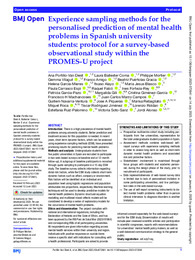Por favor, use este identificador para citar o enlazar este ítem:
https://hdl.handle.net/11000/34641Registro completo de metadatos
| Campo DC | Valor | Lengua/Idioma |
|---|---|---|
| dc.contributor.author | Portillo-Van Diest, Ana | - |
| dc.contributor.author | Ballester Coma, Laura | - |
| dc.contributor.author | Mortier, Philippe | - |
| dc.contributor.author | Vilagut, Gemma | - |
| dc.contributor.author | Amigo, Franco | - |
| dc.contributor.author | Puértolas Gracia, Beatriz | - |
| dc.contributor.other | Departamentos de la UMH::Psicología de la Salud | es_ES |
| dc.date.accessioned | 2025-01-16T18:19:29Z | - |
| dc.date.available | 2025-01-16T18:19:29Z | - |
| dc.date.created | 2023-06 | - |
| dc.identifier.citation | BMJ Open 2023;13 | es_ES |
| dc.identifier.issn | 2044-6055 | - |
| dc.identifier.uri | https://hdl.handle.net/11000/34641 | - |
| dc.description.abstract | Introduction: There is a high prevalence of mental health problems among university students. Better prediction and treatment access for this population is needed. In recent years, short-term dynamic factors, which can be assessed using experience sampling methods (ESM), have presented promising results for predicting mental health problems. Methods and analysis: Undergraduate students from five public universities in Spain are recruited to participate in two web-based surveys (at baseline and at 12-month follow-up). A subgroup of baseline participants is recruited through quota sampling to participate in a 15-day ESM study. The baseline survey collects information regarding distal risk factors, while the ESM study collects short-term dynamic factors such as affect, company or environment. Risk factors will be identified at an individual and population level using logistic regressions and population attributable risk proportions, respectively. Machine learning techniques will be used to develop predictive models for mental health problems. Dynamic structural equation modelling and multilevel mixed-effects models will be considered to develop a series of explanatory models for the occurrence of mental health problems. Ethics and dissemination: The project complies with national and international regulations, including the Declaration of Helsinki and the Code of Ethics, and has been approved by the IRB Parc de Salut Mar (2020/9198/I) and corresponding IRBs of all participating universities. All respondents are given information regarding access mental health services within their university and region. Individuals with positive responses on suicide items receive a specific alert with indications for consulting with a health professional. Participants are asked to provide informed consent separately for the web-based surveys and for the ESM study. Dissemination of results will include peer-reviewed scientific articles and participation in scientific congresses, reports with recommendations for universities' mental health policy makers, as well as a well-balanced communication strategy to the general public. | es_ES |
| dc.format | application/pdf | es_ES |
| dc.format.extent | 9 | es_ES |
| dc.language.iso | eng | es_ES |
| dc.publisher | BMJ Publishing Group | es_ES |
| dc.rights | info:eu-repo/semantics/openAccess | es_ES |
| dc.rights.uri | http://creativecommons.org/licenses/by-nc-nd/4.0/ | * |
| dc.subject | Epidemiologic studies | es_ES |
| dc.subject | Mental helth | es_ES |
| dc.subject | Public health | es_ES |
| dc.subject.other | CDU::1 - Filosofía y psicología | es_ES |
| dc.title | Experience sampling methods for the personalised prediction of mental health problems in Spanish university students: protocol for a survey- based observational study within the PROMES-Uproject | es_ES |
| dc.type | info:eu-repo/semantics/article | es_ES |
| dc.relation.publisherversion | https://doi.org/10.1136/bmjopen-2023-072641 | es_ES |

Ver/Abrir:
Portillo-Van, et al 2023 (1).pdf
1,62 MB
Adobe PDF
Compartir:
 La licencia se describe como: Atribución-NonComercial-NoDerivada 4.0 Internacional.
La licencia se describe como: Atribución-NonComercial-NoDerivada 4.0 Internacional.
.png)